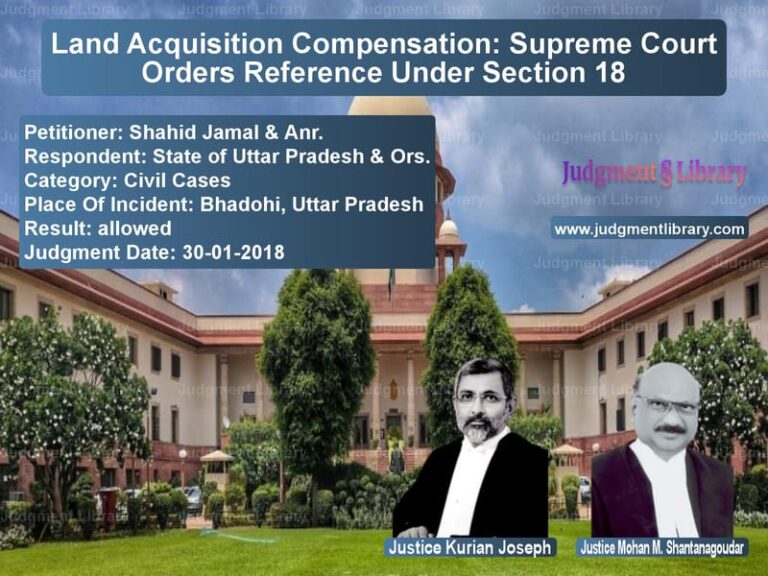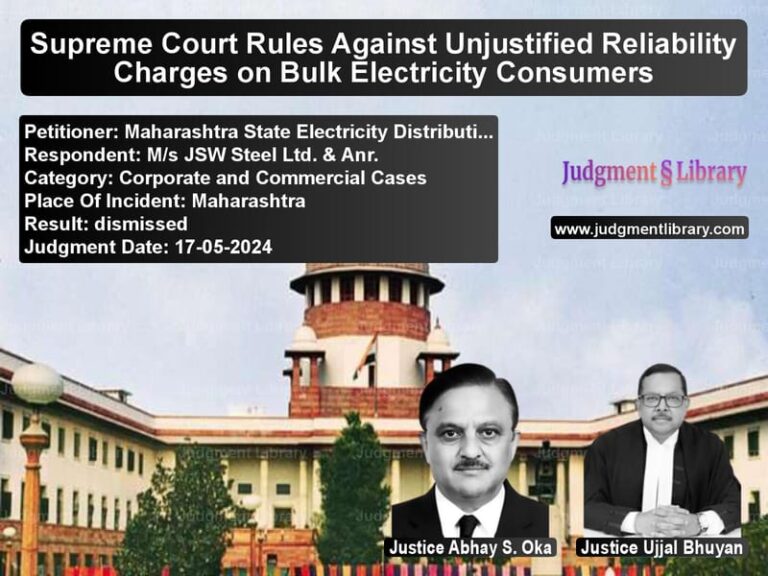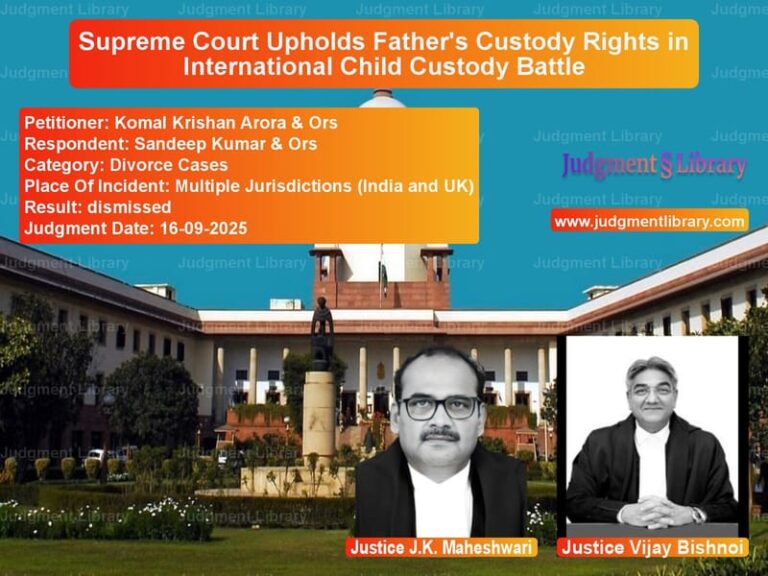Supreme Court Directs Arbitration in Chennai Port Workers’ Employment Dispute
The Supreme Court of India recently delivered its judgment in the case of Chairman Cum Managing Director, Ennore Port Trust (now Kamarajar Port Limited) vs. V. Manoharan & Ors.. The Court set aside the Madras High Court’s ruling and directed that the dispute regarding the employment status of Chennai Port workers should be referred to arbitration as per the existing Memorandum of Understanding (MOU).
Background of the Case
The case revolved around the employment status of a group of workers who had been engaged in loading, unloading, and handling coal and iron ore at the Chennai Port Trust. The workers had been seeking regularization of their services, asserting that they were employees of the Port Trust.
The dispute dated back to 1987, when the workers filed a writ petition in the Madras High Court demanding permanent employment. Over time, the case evolved, and multiple agreements, including an MOU in 1995, were signed between the Port Trust and the workers’ association. However, due to environmental concerns and a subsequent Public Interest Litigation (PIL), the operations involving coal and iron ore were shifted to Ennore Port Trust (now Kamarajar Port Trust), leading to the termination of the MOU in 2012.
Arguments Presented
Petitioners’ (Port Trusts’) Arguments
- The workers were not direct employees of the Chennai Port Trust.
- The MOU had created an arrangement where the workers were part of an association acting as an independent contractor.
- The dispute should be resolved through arbitration, as per Clause 31 of the MOU.
Respondents’ (Workers’) Arguments
- The workers had been employed by the Chennai Port Trust for decades and should be regularized.
- With the termination of the MOU, they had lost their livelihood.
- The shifting of coal and iron ore operations to Ennore Port should not affect their employment rights.
Supreme Court’s Ruling
A bench comprising Justice R.K. Agrawal and Justice Abhay Manohar Sapre ruled in favor of arbitration, setting aside the High Court’s order. The Court observed:
1. Arbitration as the Appropriate Forum
The Court held that since the MOU contained a clause requiring disputes to be referred to arbitration, the workers should have approached the Arbitral Tribunal rather than the High Court. The judgment stated:
“The writ petition filed by the respondents under Article 226 of the Constitution should not have been entertained for being tried on merits by the Single Judge, and instead, the parties should have been left to take recourse to the remedy provided in Clause 31 for referring the case to the Arbitral Tribunal.”
2. Nature of the Employment Relationship
The Court emphasized that whether the workers were direct employees of the Port Trust or part of an independent contractual arrangement was a question of fact that required detailed examination. It ruled:
“A question whether a particular person is in the employment of any establishment and whether he is entitled to claim regularization is essentially a question of fact.”
3. Fact-Finding by an Arbitral Tribunal
The Supreme Court framed several key questions that the Arbitral Tribunal must determine, including:
- Whether the workers were employees of Chennai Port Trust or a contractor?
- Whether the workers were members of the association formed under the MOU?
- What relief, if any, they were entitled to, and against which entity?
4. Directions for Speedy Resolution
The Court directed that the arbitration proceedings should be completed within six months from the date of appointment of the Arbitral Tribunal. It stated:
“Since the case is old and concerns a large number of workers, efforts should be made to complete the proceedings within six months.”
Key Observations
- The Court criticized the delay in resolving employment disputes and emphasized the need for alternative dispute resolution mechanisms.
- It reiterated that employment status disputes require a fact-finding process that is best suited for a tribunal rather than a writ petition.
- The ruling reinforced the enforceability of arbitration clauses in MOUs between employers and workers’ associations.
Conclusion
The Supreme Court’s judgment in Chairman Cum Managing Director, Ennore Port Trust vs. V. Manoharan & Ors. underscores the importance of arbitration in labor disputes where agreements specify such a mechanism. By directing the matter to the Arbitral Tribunal, the Court ensured that a detailed and fair examination of the workers’ claims would take place, preventing further legal delays.
Petitioner Name: Chairman Cum Managing Director, Ennore Port Trust (now Kamarajar Port Limited)Respondent Name: V. Manoharan & Ors.Judgment By: Justice R.K. Agrawal, Justice Abhay Manohar SapreJudgment Date: 15-02-2018
Don’t miss out on the full details! Download the complete judgment in PDF format below and gain valuable insights instantly!
Download Judgment: Chairman Cum Managin vs V. Manoharan & Ors. Supreme Court of India Judgment Dated 15-02-2018.pdf
Direct Downlaod Judgment: Direct downlaod this Judgment
See all petitions in Employment Disputes
See all petitions in Contractual Employment
See all petitions in Termination Cases
See all petitions in Judgment by R K Agrawal
See all petitions in Judgment by Abhay Manohar Sapre
See all petitions in allowed
See all petitions in Remanded
See all petitions in supreme court of India judgments February 2018
See all petitions in 2018 judgments
See all posts in Service Matters Category
See all allowed petitions in Service Matters Category
See all Dismissed petitions in Service Matters Category
See all partially allowed petitions in Service Matters Category







